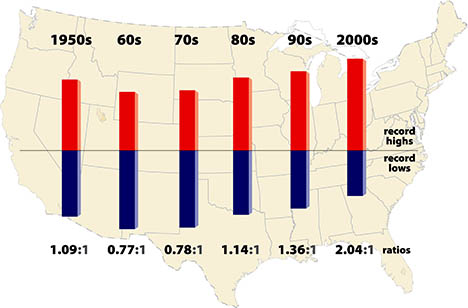Rebuttal to 'Scientist's Can't Even Predict The Weather Right'
Posted on 24 January 2011 by dansat
This claim is based more on an appeal to emotion than fact. The inference is that climate predictions, decades into the future, cannot be possibly right when the weather forecast for the next day has some uncertainty.
In spite of the claim in this myth, short term weather forecasts are highly accurate and have improved dramatically over the last three decades. However, slight errors in initial conditions make a forecast beyond two weeks nearly impossible.
Atmospheric science students are taught "weather is what you get and climate is the weather you expect". This is why this common skeptical argument doesn't hold water. Climate models are not predicting day to day weather systems. Instead, they are predicting climate averages.

Figure 1: Record highs are an example of extreme weather, but an increase in record highs versus record lows is a symptom of a changing climate. From Meehl et al.*
A change in temperature of 7º Celsius from one day to the next is barely worth noting when you are discussing weather. Seven degrees, however, make a dramatic difference when talking about climate. When the Earth's AVERAGE temperature was 7ºC cooler than the present, ice sheets a mile thick were on top of Manhattan!
A good analogy of the difference between weather and climate is to consider a swimming pool. Imagine that the pool is being slowly filled. If someone dives in there will be waves. The waves are weather, and the average water level is the climate. A diver jumping into the pool the next day will create more waves, but the water level (aka the climate) will be higher as more water flows into the pool.
In the atmosphere the water hose is increasing greenhouse gases. They will cause the climate to warm but we will still have changing weather (waves). Climate scientists use models to forecast the average water level in the pool, not the waves. A good basic explanation of climate models is available in Climate Change- A Multidisciplinary Approach by William Burroughs.
Source: AMS Policy Statement on Weather Analysis and Forecasting. Bull. Amer Met. Soc., 79, 2161-2163
*Image source: Meehl, G. A., C. Tebaldi, G. Walton, D. Easterling, and L. McDaniel (2009), Relative increase of record high maximum temperatures compared to record low minimum temperatures in the U.S., Geophys. Res. Lett., 36, L23701, doi:10.1029/2009GL040736.
This blog post is the Basic Rebuttal of the skeptic argument 'Scientists can't even predict weather'. It was written by Dan Satterfield, Chief Meteorologist for WHNT TV (CBS) in Huntsville and writer of Dan's Wild, Wild Science Journal.































 Arguments
Arguments
























 0
0  0
0









Comments